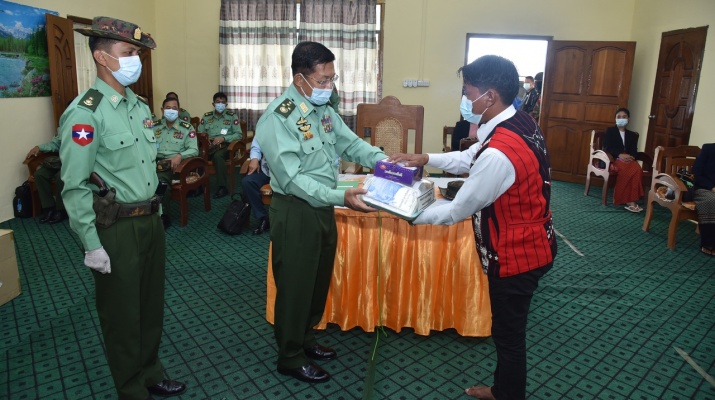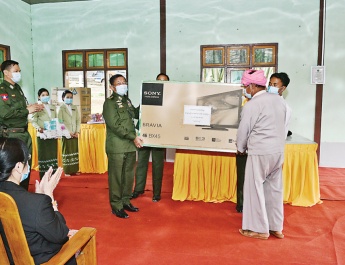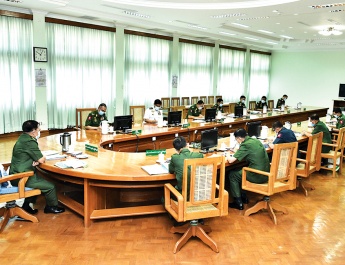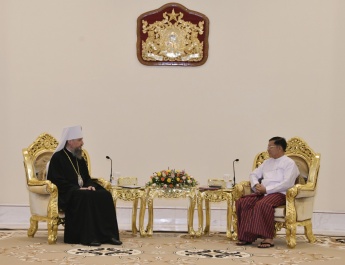Nay Pyi Taw October 26
An educated new generation is a must to shape a better future of the country, and additionally, the encouragement of the education is also a must as educated visionaries are the requisite for the establishment of democracy that is systematic and well ordered. As natives are the only persons who can take the leading role in serving the interest of their own place, and it is also their obligation, they must make collective efforts, said Commander-in-Chief of Defence Services Senior General Min Aung Hlaing in his separate meetings with town elders and departmental personnel of Leshi and Lahe of Naga Self-Administered Zone and Hkamti of Sagaing Region at the respective Yeiktha halls where COVID-19 prevention, control and treatment aids were also presented.
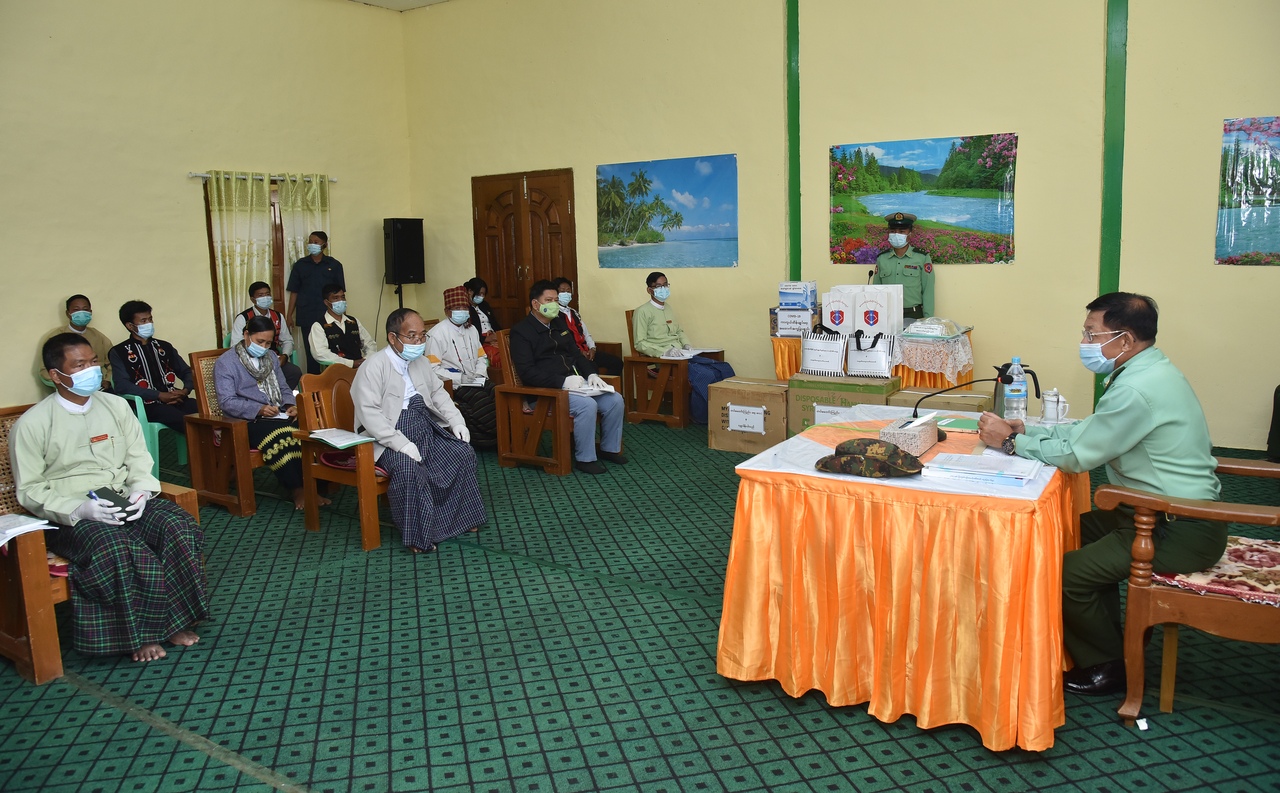
Also present were Daw Kyu Kyu Hla, wife of the Senior General, Commander-in-Chief (Air) General Maung Maung Kyaw and wife, senior military officers from the Office of the Commander-in-Chief (Army) and their wives, Commander of North-West Command Maj-Gen Myo Moe Aung and wife, town elders, local people and departmental personnel of Leshi, Lahe and Hkamti, and Tatmadaw members of local units.
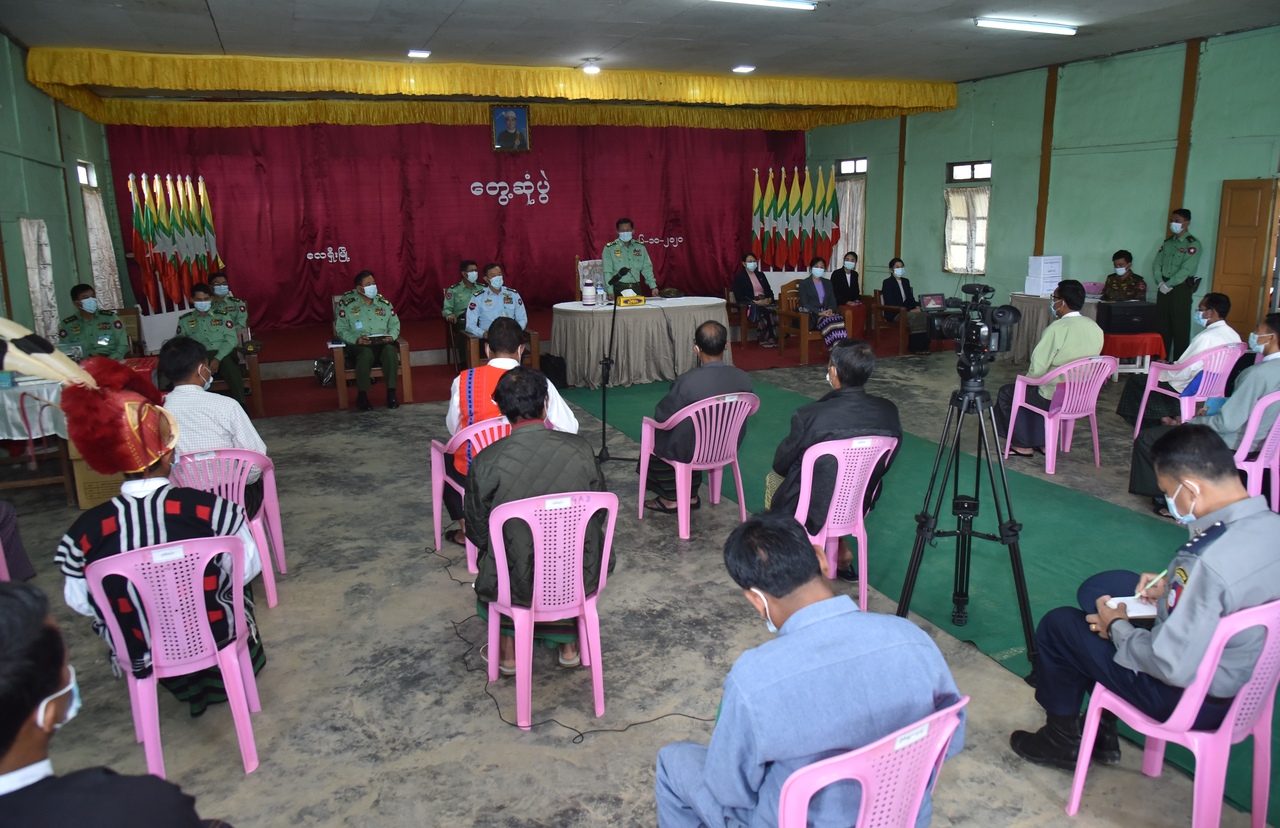
On their arrival at the Yeiktha in Leshi, Sarameri Yeiktha in Lahe, and Nansibum Yeiktha in Hkamti, the venues of the meetings, the Senior General and party were welcomed by U K Sai, Chairman of the Leading Body of Naga Self-Administered Zone, town elders, departmental personnel and Tatmadaw members of local units.
In his discussions in connection with the provision of COVID-19 prevention, control and treatment aids and the regional development undertakings, the Senior General said it is his first visit to Leshi of the Naga Self-Administered Zone. The town is located over 4,400 feet above the sea level, and has a population of only over 18,000. As a town is located at the border with India, he has been interested in Leshi since the past. The Senior General said he had visited a Naga village near Chindwin River while serving duties in the North-West Command area. The village was conducting highland farming systematically with the technology learned from India. He expressed pleasure to know that Leshi does not need to buy rice from other places. If the town has to import rice from other places, the transportation cost will be very high. He said he is happy to witness that although Leshi is a small town, it has the characteristics of a town to a certain degree.
As Naga region is a self-administered zone, natives can do more for the development of their homeland. Efforts should be made to narrow the gap between states and regions and between one place and the other. As the local governments are striving for the development of their respective places, local people must also exert concerted efforts for the development of their native places. The Tatmadaw is also rendering assistance area wise to realize this goal. The involvement of knowledgeable persons will accelerate the pace of development, so greater encouragement of the education is a must. The self-administered zone has a low matriculation pass rate. Although student population is high at the primary school level, it gradually drops at the higher levels. Only ten percent of students who attended primary school pass the matriculation examination. An educated new generation is a must to shape a better future of the country, and additionally, the encouragement of the education is also a must as educated visionaries are the requisite for the establishment of democracy that is systematic and well-ordered.
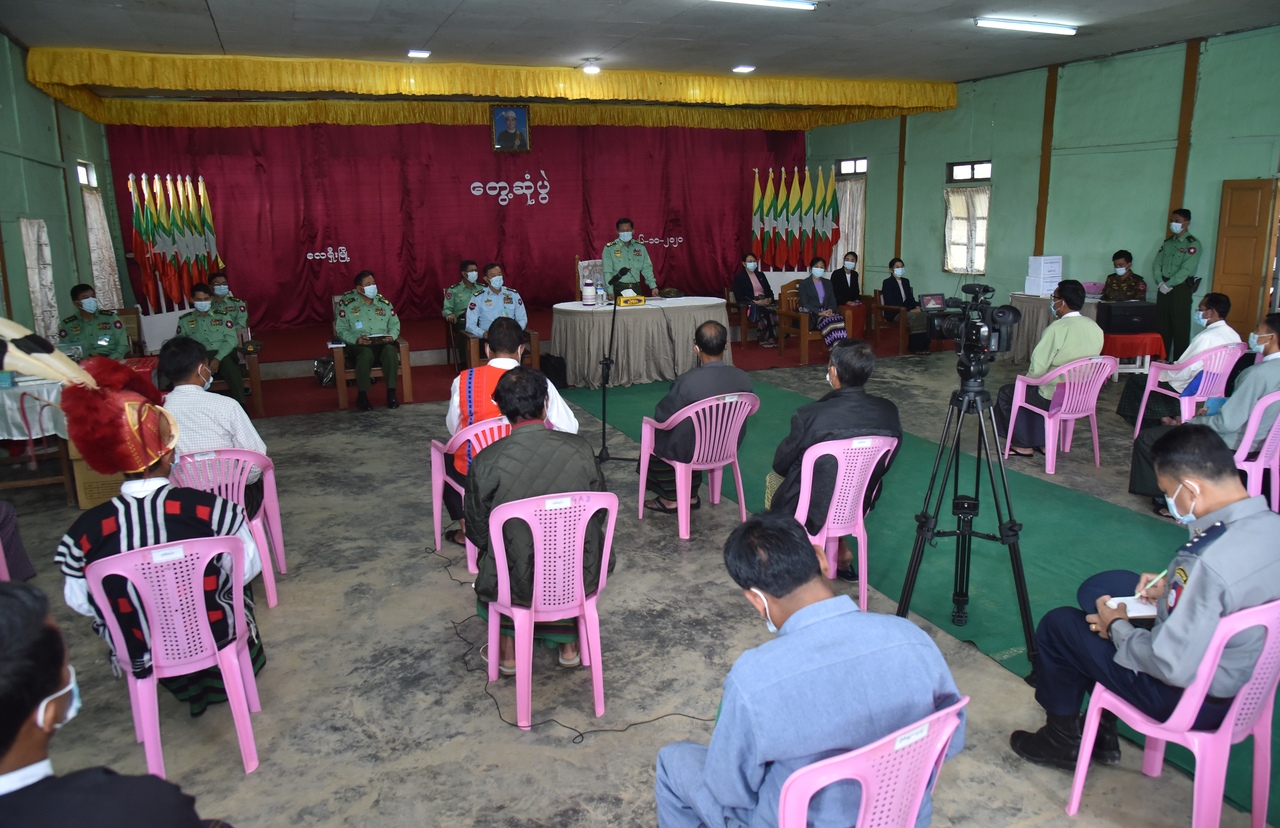
As one can pursue education only if one is healthy, it is necessary to stay health free from COVID-19 and other diseases. Talking about Tatmadaw’s assistance for healthcare for local people in far-flung areas including Naga region, the Senior General said:
“Regarding the health sector, I came to Lahe for attending the Naga New Year Festival in 2015. President U Thein Sein and I visited there. Leading Committee Chairman U Ro San Kyu reported about shortages of medical doctors there. I also listened to him because I was a guest also. Before he said I already knew from books that the country was badly in need of doctors. Sagaing Region had difficulty sending doctors there. The Health Minister was also there. With such difficulties in sight, we considered one thing after another. Then, I suggested the Tatmadaw would send doctors to the Naga region. As I used to live in Homalin, I know local affairs very well. They were so delighted. First, our doctors were for Naga. Over 80 military medical doctors reported their volunteering. We sent 44 of them there. There were eight doctors for Naga and the rest for Chin State which had very poor transport. There are farthest Nanyun, Donhee, Lahe and Yamkyon. We asked how many doctors were there in Lashi. They said two. In some regions, there were only nurses. We have sent our doctors in three batches over the past four or five years. This is for your health. As we can work only if we are healthy, our Tatmadaw is helping so you can carry out your regional development tasks. We can give you help only. It is the local people who have to really work. I want to say we will help what we can. But we have to struggle to be perfect for the area.”
The Senior General said multi-party democracy election will soon be held. Election is the essence of democracy. He stressed the need to choose capable for serving the regional and national interests as they have to represent the people. The country has two kinds of political parties, one is based on politics and the other based on ethnic cause. Nonetheless, those who will be serving the best interest must be elected. Talking about the indecency of demanding rights through violence means in a democratic country, the Senior General said:
“Everything cannot be demanded in every aspect. But local people need to demand their rights in a correct way and on a right track to develop their regions correctly. They need to consider this so that they cannot lose those rights. I urge you to consider using your rights in a correct manner. We show no discrimination. The important thing is that the ones you choose must be able to serve their regions and country. Ours is a nascent democracy. Reviewing over the past ten years, we have difficulties. We need to overcome them. Peace is essential in terms the peace issue. Without peace, we will find it difficult to get the representatives capable of serving the regional and national interests. There might be difficulties doing things in a democratic way. This is why we have been trying to achieve peace since 2011 when the first democratic government took office. On 15 October this year, the NCA signing passed five years. The agreement was made in 2015. This is a step forward our peace. Holding on to this, we have to try to achieve eternal peace. So in a democratic country, it is not good to demand rights through violence means. Violence also includes unrest protests. It ranges from that to picking up arms and bullying. These are all violent ways. I mean with armed or without armed.”
The Senior General said that Leshi, Lahe and Hkamti have developed much more than before but it is still necessary to do a lot more for further development and urged all to find ways and means to generate electricity required for the region from the resources provided by the nature and to cooperate for the regional development, which can only be achieved with the efforts of the local residents.
Afterwards, Chairman U K Sai of the Naga Self-Administered Zone Leading Body and town elders reported to the Senior General on difficulties faced in the region and requirements for communication and regional development. The Senior General fulfilled the requirements.
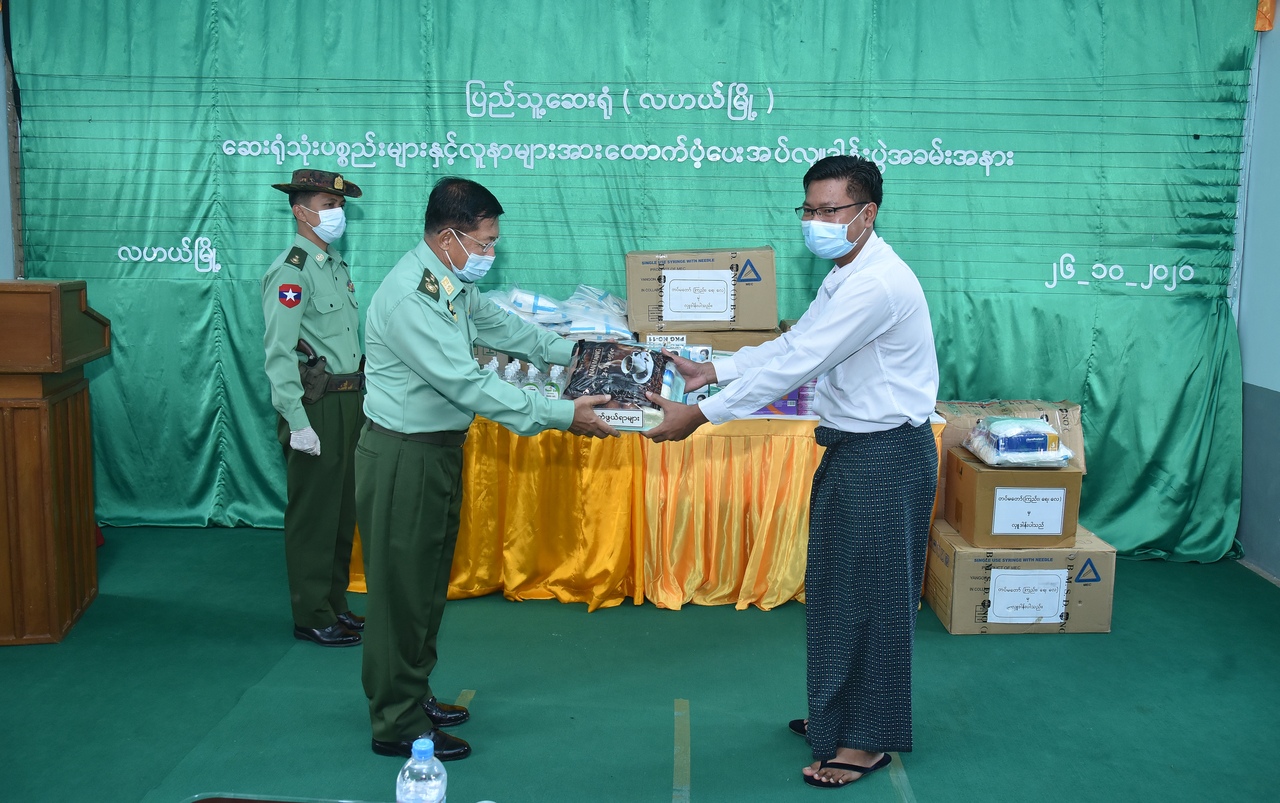
Then, the Senior General presented equipment for the prevention, control and treatment of COVID-19 including 150 surgical masks, 30 face shields, 1,000 pairs of examination gloves, foodstuffs and household goods produced by factories of the Tatmadaw for each of the three townships to Leshi Township Administrator U Naing Naing Oo, Lahe Township Administrator U Nay Min Thu, Hkamti Township Administrator U Hla Myo and town elders respectively.
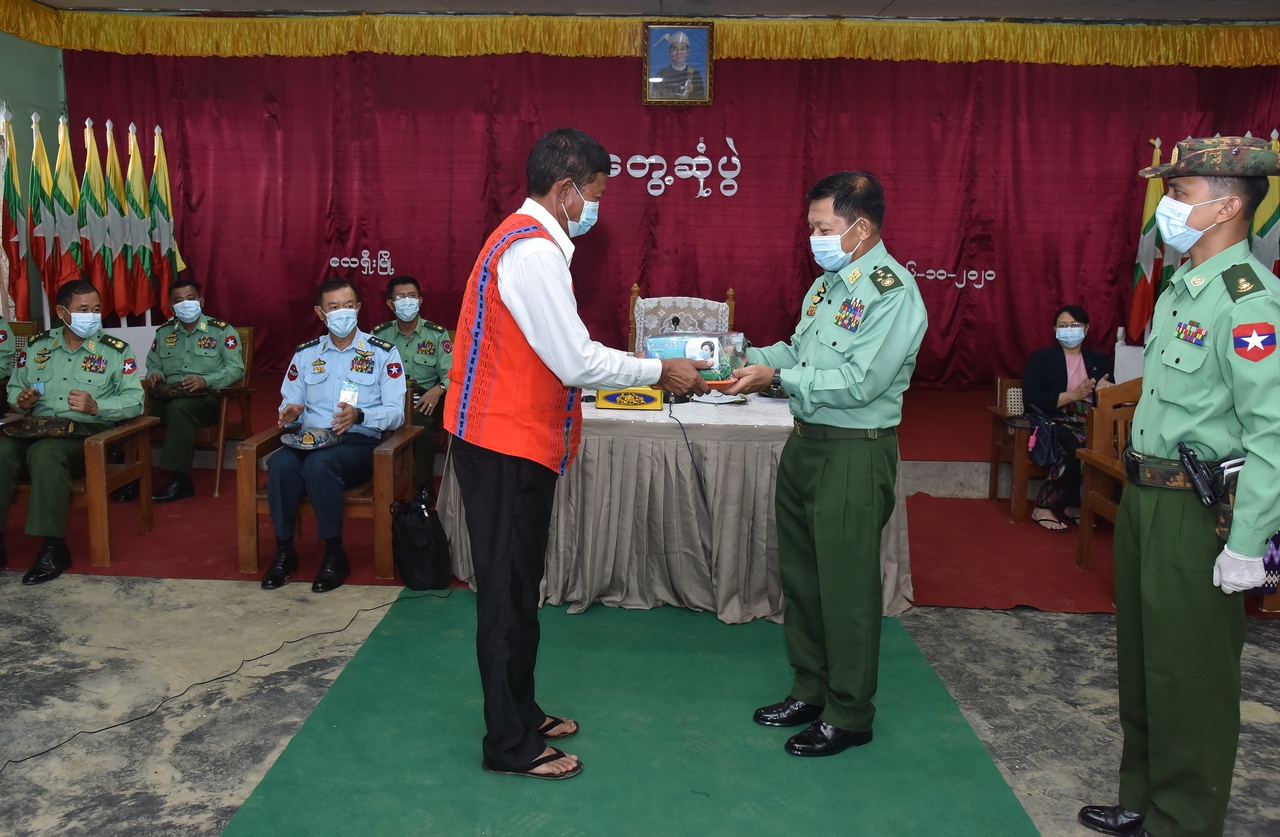
Afterwards, the Senior General and party cordially greeted the town elders and departmental personnel who attended the meeting.
After the meetings, the Senior General and party proceeded to Theravada Buddhism missionary centres in Leshi and Lahe in the Naga Self-Administered Zone and paid homage to presiding abbot Bhaddanta Dassana and Bhaddanta Sumana. Then, the Senior General offered 30 bags of rice, 45 viss of edible oil, 15 viss of salt, 100 viss of gram, household goods produced by factories of the Tatmadaw, foodstuffs and cash for nine prerequisites donated by the families of the Tatmadaw (Army, Navy and Air) to the abbot and inquired about the missionary tasks being carried out by the abbot. The Senior General and party proceeded to Sasanahita Myoma Monastery on Yankin Hill in Hkamti and paid homage to Presiding Abbot Sasana Takkasila Maha Dhammacariya Bha-ddanta Nandapala before offering four food items including rice, edible oil, salt and gram, household goods produced by Tatmadaw factories, cash for nine prerequisites and foodstuffs donated by families of the Tatmadaw (Army, Navy and Air) to the abbot. Moreover, Daw Kyu Kyu Hla, the wife of the Senior General, offered four food items including rice, edible oil, salt and gram and alms to nuns and received a sermon delivered by the abbot. Then, the Senior General paid homage to Myatheintan Pagoda and signed the guest book of the pagoda before donating cash for all-round renovation of the pagoda to the board of trustees.
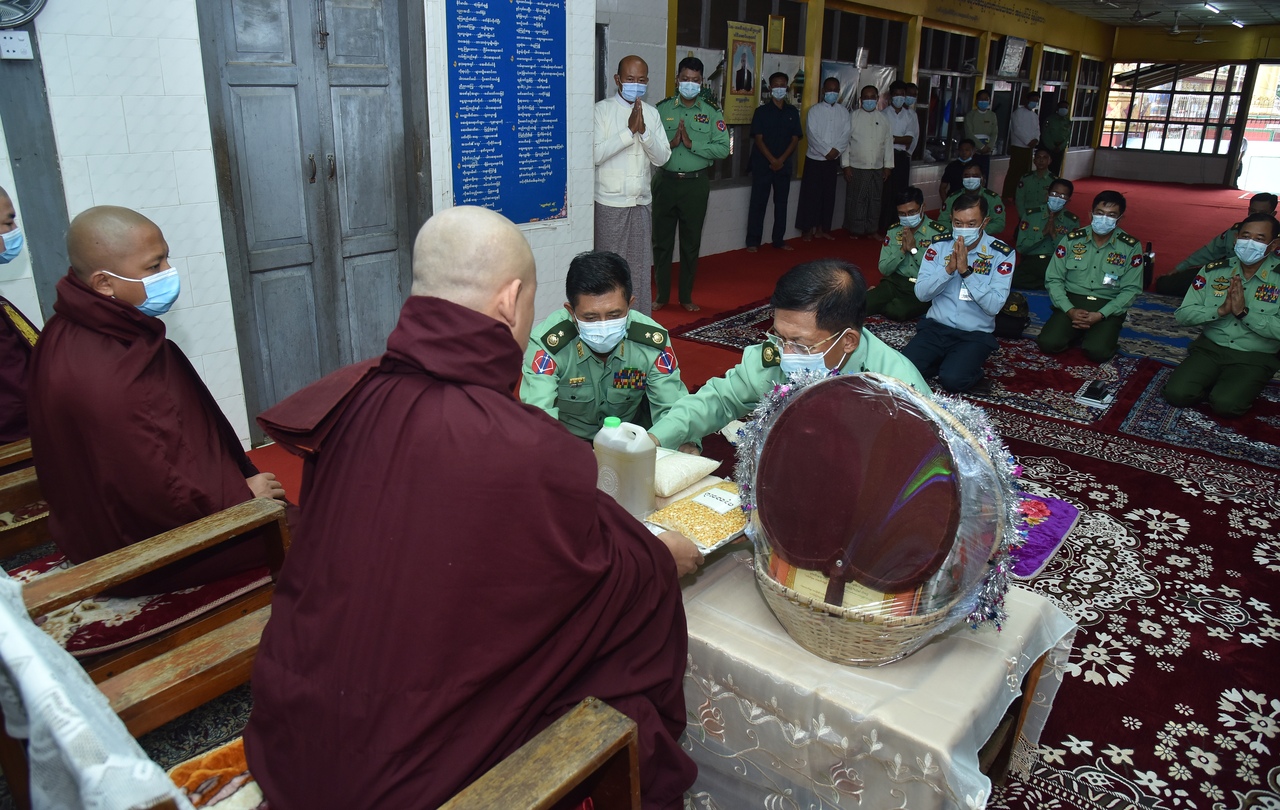
Later, the Senior General and party visited people hospitals in Leshi and Lahe in the Naga Self-Administered Zone and Hkamti in Sagaing Region and presented equip-ment for prevention, control and treatment of COVID-19 including 5,150 surgical masks, 130 face shields, 50 sets of personal protective equipment-PPE, 30 bottles of hand gel, 100 N95 masks, 1,500 pairs of examination gloves, foodstuffs and household goods produced by factories of the Tatmadaw to respective medical superintendents of the hospitals.


